|
|
|
Sort Order |
|
|
|
Items / Page
|
|
|
|
|
|
|
| Srl | Item |
| 1 |
ID:
128265
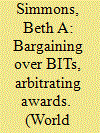

|
|
|
|
|
| Publication |
2014.
|
| Summary/Abstract |
The regime for international investment is extraordinary in public international law and controversial in many regions of the world. This article explores two aspects of this set of rules: its decentralization and the unusual powers it gives to private actors to invoke dispute settlement. Decentralization has contributed to a competitive environment for ratification of bilateral investment treaties (BITs) and has elevated the importance of dyadic bargaining power in the formation of the regime. Governments of developing countries are more likely to enter into BITs and tie their hands more tightly when they are in a weak bargaining position, which in turn is associated with economic downturns of the domestic economy. Once committed, investors have sued governments with surprising regularity, arguably contributing disproportionately to legal awards that favor the private corporate actors who have the power to convene the dispute settlement system. States have begun to push back, revising their obligations and attempting to annul arbitral awards. One of the conclusions is that it is important not only to consider whether BITs attract capital-which has been the focus of nearly all the empirical research on BIT effects-but also to investigate the governance consequences of the international investment regime generally.
|
|
|
|
|
|
|
|
|
|
|
|
|
|
|
|
| 2 |
ID:
106398


|
|
|
|
|
| Publication |
2011.
|
| Summary/Abstract |
Foreign direct investment (FDI) has increased rapidly in East Asian countries over the past two decades, and many studies find that it has significant linkages with economic growth. This paper examines the impacts of FDI in groups of 15 East Asian countries classified by level of economic development, using panel data analysis together with cointegration methods. The results show that favourable impacts of FDI on East Asian countries depend on complementary factors, particularly each host country's economic conditions such as levels of financial market development, institutional development, better governance, and appropriate macroeconomic policies. Furthermore, East Asian countries need to increase their investment in fundamental infrastructures, human capital development, and facilities for enhancing international trade and investment climate.
|
|
|
|
|
|
|
|
|
|
|
|
|
|
|
|
| 3 |
ID:
128266


|
|
|
|
|
| Publication |
2014.
|
| Summary/Abstract |
Although many features of bilateral investment treaties (BITs) are consistent from one agreement to the next, a closer look reveals that the treaties exhibit considerable variation in terms of their enforcement provisions, which legal scholars have singled out as the central component of the treaties. An original data set is compiled that captures three important treaty-design differences: whether the parties consent in advance to international arbitration, whether they allow treaty obligations to be enforced before an institutionalized arbitration body, and how many arbitration options are specified for enforcement. Drawing upon several relevant literatures on international institutions, three potentially generalizable explanations for this important treaty variation are articulated and tested. The strongest support is found for the theoretical perspective that emphasizes the bargaining power and preferences of capital-exporting states, which use the treaties to codify strong, credible investor protections in all their treaties. Empirical tests consistently reveal that treaties contain strong enforcement provisions-in which the parties preconsent to multiple, often institutionalized arbitration options-when the capital-exporting treaty partner has considerable bargaining power and contains domestic actors that prefer such arrangements, such as large multinational corporations or right-wing governments. In contrast, there is no evidence to support the popular hands-tying explanation, which predicts that investment-seeking states with the most severe credibility problems, due to poor reputations or weak domestic institutions, will bind themselves to treaties with stronger investment protections. likewise, little support is found for explanations derived from the project on the rational design of international institutions, which discounts the identities and preferences of the treaty partners and instead emphasizes the structural conditions they jointly face. In sum, this foundational study of differences across investment treaties suggests that the design of treaties is driven by powerful states, which include elements in the treaties that serve their interests, regardless of the treaty partner or the current strategic setting.
|
|
|
|
|
|
|
|
|
|
|
|
|
|
|
|
| 4 |
ID:
043092
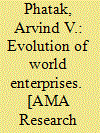

|
|
|
|
|
| Publication |
Washington, American management association, Inc., 1971.
|
| Description |
ix,213p.Hbk
|
| Series |
AMA Research book
|
| Standard Number |
0-8144-5267-1
|
|
|
|
|
|
|
|
|
|
|
|
Copies: C:1/I:0,R:0,Q:0
Circulation
| Accession# | Call# | Current Location | Status | Policy | Location |
| 011165 | 658.1599/PHA 011165 | Main | On Shelf | General | |
|
|
|
|
| 5 |
ID:
100772
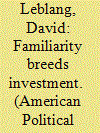

|
|
|
|
|
| Publication |
2010.
|
| Summary/Abstract |
What explains cross-national patterns of international portfolio and foreign direct investment (FDI)? While existing explanations focus on the credibility of a policy maker's commitment, we emphasize the role of diaspora networks. We hypothesize that diaspora networks-connections between migrants residing in investing countries and their home country-influence global investment by reducing transaction and information costs. This hypothesis is tested using dyadic cross-sectional data for both portfolio and FDI. The findings indicate that even after controlling for a multitude of factors, disapora networks have both a substantively significant effect and a statistically significant effect on cross-border investment.
|
|
|
|
|
|
|
|
|
|
|
|
|
|
|
|
| 6 |
ID:
137967


|
|
|
|
|
| Publication |
New Delhi, Orient Blackswan, 2015.
|
| Description |
xix, 298p.Hbk
|
| Standard Number |
9788125057741
|
|
|
|
|
|
|
|
|
|
|
|
Copies: C:1/I:0,R:0,Q:0
Circulation
| Accession# | Call# | Current Location | Status | Policy | Location |
| 058196 | 332.6730954/PAN 058196 | Main | On Shelf | General | |
|
|
|
|
| 7 |
ID:
128267
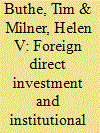

|
|
|
|
|
| Publication |
2014.
|
| Summary/Abstract |
International trade agreements lead to more foreign direct investment (FDI) in developing countries. This article examines the causal mechanisms underpinning this trade-investment linkage by asking whether institutional features of preferential trade agreements (PTAs), which allow governments to make more credible commitments to protect foreign investments, indeed result in greater FDI. The authors explore three institutional differences. First, they examine whether PTAs that have entered into force lead to greater FDI than PTAs that have merely been negotiated and signed, since only the former constitute a binding commitment under international law. Second, they ask whether trade agreements that have investment clauses lead to greater FDI. Third, they consider whether PTAs with dispute-settlement mechanisms lead to greater FDI. Analyses of FDI flows into 122 developing countries from 1971 to 2007 show that trade agreements that include stronger mechanisms for credible commitment induce more FDI. Institutional diversity in international agreements matters.
|
|
|
|
|
|
|
|
|
|
|
|
|
|
|
|
| 8 |
ID:
130971
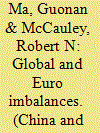

|
|
|
|
|
| Publication |
2014.
|
| Summary/Abstract |
We analyze global and euro area imbalances by focusing on China and Germany as large surplus and creditor countries. In the 2000s, domestic reforms expanded the effective labor force, restrained wages, shifted income toward profits and increased corporate saving. As a result, the Chinese and German current account surpluses widened, and that of Germany has proven more persistent, with subdued domestic investment. China is an early-stage creditor, holding a short equity position and a long position in safe debt. Germany's balanced net debt and equity claims mark it as a mature creditor that provides insurance to the rest of the world. China pays to lay off equity risk, while Germany, by contrast, harvests a moderate yield on its net claims. In both economies, the shortfall of the net international investment position from cumulated current account surpluses arises from exchange rate changes, asymmetric valuation gains, and, in Germany's case, credit losses.
|
|
|
|
|
|
|
|
|
|
|
|
|
|
|
|
| 9 |
ID:
147628


|
|
|
|
|
| Summary/Abstract |
We will provide an outlook for China's role in the world economy over the coming decades, an exercise which would not be possible without an analysis of the prospects for China's continued economic growth. Based on international and historical comparisons, we argue that today's China meets all three key conditions for continued economic growth, including a stable government that is supportive of a market economy; high and increasing quality of human capital, and openness to developed economies. Dependent on China's continued growth, we explore how China will impact many other economies through trade and investment, creating winners and losers in the world economy. Moreover, we argue that China will become a more active player in changing global economic governance not only through participating in reforms of existing institutions but also by leading efforts to establish new ones.
|
|
|
|
|
|
|
|
|
|
|
|
|
|
|
|
| 10 |
ID:
102846
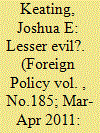

|
|
|
| 11 |
ID:
086427


|
|
|
|
|
| Publication |
2009.
|
| Summary/Abstract |
Over the past decade, a number of countries in the Asia Pacific region have concluded a new generation of FTAs that liberalise trade in goods and services while also containing investment protection provisions. This paper provides an overview of the recent trends giving special attention to the impact of Investor State Dispute Settlement (ISDS) cases which has influenced the evolution of investment rule-making over the last decade. The paper asserts that investment disputes have influenced the refinement of the provisions of the new generation of investment agreements as well as the inclusion of a series of procedural and substantive innovations in these agreements.
*Ambassador of Costa Rica to the European Union, Belgium and Luxembourg. This paper was written on the basis of several research projects in which the author participated, before assuming the current position with the Costa Rican government, as consultant with UNCTAD. However, the opinions and views expressed in this paper do not represent the position of UNCTAD, nor the Government of Costa Rica and fully fall under responsibility of the author.
|
|
|
|
|
|
|
|
|
|
|
|
|
|
|
|
| 12 |
ID:
040925


|
|
|
|
|
| Publication |
New York, John Wiley and Sons, Inc., 1968.
|
| Description |
vi, 269p.Hbk
|
|
|
|
|
|
|
|
|
|
|
|
Copies: C:1/I:0,R:0,Q:0
Circulation
| Accession# | Call# | Current Location | Status | Policy | Location |
| 004238 | 658.4034/HAN 004238 | Main | On Shelf | General | |
|
|
|
|
| 13 |
ID:
168200


|
|
|
|
|
| Summary/Abstract |
We argue that the World Bank has successfully marshaled the Ease of Doing Business (EDB) Index to amass considerable influence over business regulations worldwide. The Ease of Doing is a global performance indicator (GPI), and GPIs—especially those that rate and rank states against one another—are intended to package information to influence the views of an audience important to the target, such as foreign investors or voters, thus generating pressures that induce a change in the target's behavior. The World Bank has succeeded in shaping the global regulatory environment even though the bank has no explicit mandate over regulatory policy and despite questions about EDB accuracy and required policy tradeoffs. We show that the EDB has a dominating market share among business climate indicators. We then use media analyses and observational data to show that EDB has motivated state regulatory shifts. States respond to being publicly ranked and some restructure bureaucracies accordingly. Next we explore plausible influence channels for the EDB ranking and use an experiment involving US portfolio managers to build on existing economics research and examine whether the rankings influence investor sentiment within the experiment. Using a case study of India's multiyear interagency effort to rise in the EDB rankings, as well as its decision to create subnational EDB rankings, we bring the strands of the argument together by showing how politicians see the ranking as affecting domestic politics, altering investor sentiment, and engaging bureaucratic reputation. Overall, a wide variety of evidence converges to illustrate the pressures through which the World Bank has used state rankings to achieve its vision of regulatory reform.
|
|
|
|
|
|
|
|
|
|
|
|
|
|
|
|
| 14 |
ID:
130938


|
|
|
|
|
| Publication |
2014.
|
| Summary/Abstract |
Ten years after the U.S. invasion and two years after the complete withdrawal of American forces from its soil, Iraq faces a number of challenges to its long-term stability and development. These range from corruption to poor public services, from rising terrorist violence to ethnosectarian tensions in the context of a complex power-sharing system. An important, but often overlooked, aspect of Iraq's political scene concerns the dispute between the federal government and the Kurdish Regional Government (KRG) over the management of the country's and the Kurdish region's natural resources and over appropriate revenue-sharing mechanisms. The parties have been stuck in a costly political stalemate for the past few years, as the absence of a federal hydrocarbon law has discouraged international investment in Iraq's natural resources, and oil extracted from KRG-controlled fields has had only intermittent access to international markets.
|
|
|
|
|
|
|
|
|
|
|
|
|
|
|
|
| 15 |
ID:
153606
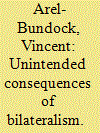

|
|
|
|
|
| Summary/Abstract |
The international tax system is a complex regime composed of thousands of bilateral tax treaties. These agreements coordinate policies between countries to avoid double taxation and encourage international investment. I argue that by solving this coordination problem on a bilateral basis, states have inadvertently created opportunities for treaty shopping by multinationals. These opportunities, in turn, reduce the potency of fiscal policy, put pressure on governments to change their domestic tax laws, and ultimately constrain state autonomy. This constraint is theoretically distinct from the usual race-to-the-bottom story and it generates different testable implications. I use a motivating case study to show how multinationals leverage the structure of the treaty network to reduce their tax burden. Then, I develop a new measure of treaty-shopping opportunities for firms in 164 countries. Where the proliferation of tax treaties allows multinationals to engage in treaty shopping, states’ fiscal autonomy is limited, and governments tend to maintain lower tax rates.
|
|
|
|
|
|
|
|
|
|
|
|
|
|
|
|
|
|
|
|
|